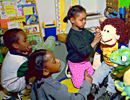SEL Parent Workshops: How Group Dynamics Enhance Problem-Solving and Parenting Skills

Check out our blog for social-emotional learning articles, news, and more!

Gardner, F., Burton, J., & Klimes, I. (2006). Randomised controlled trial of a parenting intervention in the voluntary sector for reducing child conduct problems: outcomes and mechanisms of change. Journal of Child Psychology and Psychiatry 47: 11, pp 1123–1132. doi:10.1111/j.1469-7610.2006.01668.x
Background: to test effectiveness of a parenting intervention (The Incredible Years), delivered in a community-based voluntary-sector organisation, for reducing conduct problems in clinically-referred children.
Methods: Randomised controlled trial, follow-up at 6, 18 months, assessors blind to treatment status. Participants - 76 children referred for conduct problems, aged 2-9, primarily low-income families, randomised to treatment vs. 6-month wait-list group. Retention was 93% at 6 months, 90% at 18 months. Interventions - Webster-Stratton Incredible Years video-based 14-week group programme. Intervention teaches cognitive-behavioural principles for managing behaviour, using a collaborative, practical, problem-solving approach. Primary outcomes - child problem behaviour by parent-report (Eyberg) and home-based direct observation; Secondary outcomes - observed positive and negative parenting; parent-reported parenting skill, confidence and depression. All measures standardised and well-validated.
Results: Group differences were tested using ANCOVA, controlling for baseline levels. Post-treatment improvements were found in child problem behaviour, by parent-report (effect size (ES) .48, p=.05) and direct observation (ES .78, p=.02); child independent play (ES .77, p=.003); observed negative (ES .74, p=.003) and positive (ES .38, p=.04) parenting; parent-reported confidence (ES .40, p=.03) and skill (ES .65, p=.01). Maternal depression did not change. Consumer satisfaction was high. At 18-month follow-up, no randomised comparison was possible. However, changes appeared to maintain at 18-month follow-up, with no significant change toward baseline level on any measure. Change in observed positive parenting appeared to mediate change in child problem behaviour.
Conclusions: Findings suggest that a group-based cognitive-behavioural parenting programme, delivered by well-trained and supervised staff can be effective in a community voluntary-sector setting, for reducing conduct problems and enhancing parenting skills. Change in parenting skill appears to be a key mechanism for change in child behaviour. Findings have implications for feasibility of translating evidence-based programmes, even for clinically-referred conduct problems, into less specialised community settings, likely to have lower costs and be more accessible for families.





